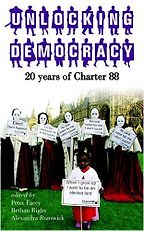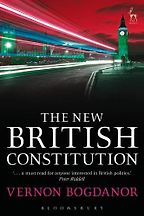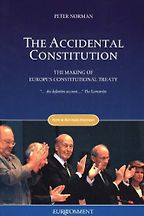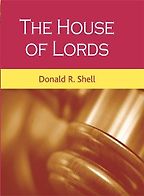Unlocking Democracy by Peter Facey is your first book, the history of 20 years of Charter 88, a British pressure group that advocated constitutional and electoral reform (owing its origins to the lack of a written constitution in the United Kingdom).
Yes, and it’s looking forward with contributions from a lot of different people, such as David Cameron, Gordon Brown, Nick Clegg, Helena Kennedy… It’s a pot-pourri for anybody who wants to start on the issue of how to reform the British political system. It’s got a very good, broad perspective, and then I go into much more detail with the other four books that I’ve chosen.
Which of the particular contributions did you like?
Well I think it is interesting, with an election in Britain, to get the rather general views of the three party leaders. But for me the fundamental issue about Charter 88 is that it came at a point when the SDP [the Social Democratic Party] was more or less folding up, and I was always very impressed as foreign secretary with Charter 77, which is really an international campaign for doing something about human rights, and what seemed to me in 1988 absolutely crucial was that we had to involve the non-politician.
The founders of Charter 88, I think, managed to keep it all-party, and they did manage to build support for quite a lot of the constitutional reform that the politicians agreed on, or at least, had championed. Much wider support. That was very necessary when you think that we went into referendums on Scottish devolution, and Welsh devolution, which was only just won.
And we have to remember that 1988 was a period of real constitutional stasis, wasn’t it? I mean, hardly anything changed in the constitution since the aborted devolution vote back in the late 1970s.
Yes. That was in 1979, and I, in fact, supported it as a member of Jim Callaghan’s Cabinet. But it was very obvious that the Labour Government, and certainly the Labour Party, was very split on devolution, and took a long time to convince Labour that there had to be a legislative devolution.
I like to think that the SDP during the 80s, which was a very strong campaign for constitutional reform, helped generate that movement. But as I say, it needed something much more, and Charter 88 came up really as the result of a letter in the New Statesman.
It’s done extremely well. And Anthony Barnett and people associated with it, such as Geoffrey Bindman, have done great work in my view.
So what is your second book?
Well I think this should be The New Constitution by Vernon Bogdanor. It’s a quite remarkable book.
Vernon is an interesting man. Funnily enough, he was David Cameron’s tutor at Oxford – and said that David Cameron was one of his brightest ever pupils. He was a Conservative, he came into the SDP – I don’t quite know where he is, politically, now. He’s Professor of Government at Oxford University. I think he’s got a broad perspective, and the important thing about his book is that he says that we absolutely do, by now, have a written constitution. It’s a myth going on, talking about the Great British anomaly of not having a written constitution.
He argues, I think very convincingly, that if you put together the continued treaties of the European Union, and you add to it legislative devolution in Scotland and in Wales and the power-sharing constitutional arrangement in Northern Ireland, and on top of that you add the fact that we made the European Convention on Human Rights, which is nothing to do with the European Union, which came in after the Second World War, and built up a great deal of authority, and now made that justiciable in the British legal system – that is what most countries would call a constitution.
Does he talk about future constitutional reform?
Yes, he outlines most of the new ways that it could be done. You find in the book for example a really detailed analysis of hung parliaments – governing without a majority. The Human Rights Act is discussed, and all the complexities of it, and the problems that the Human Rights Act is actually creating in Britain at the moment (with holding terror suspects and so on).
On devolution, he discusses in some detail fixed-term parliaments, which I think holds the actual key to whether or not we can make substantive changes, and of course all the history of and the potential of referendums, which in my view has been an extremely important reform.
Without the referendum in 1975, I don’t think we would have had the subsequent, fairly long period – nearly 25 years – of broad acceptance of British European Union membership. Certainly without it I think we would have not have been able to handle the Labour Party when they came out in favour of leaving the European Union without even a referendum.
I think a referendum for constitutional questions is very important – widening democracy out from the political elite – and I think referendums have been an extremely important step in stopping us going into the Euro. In the financial crisis, at least in terms of growth, we have been able to devalue, we’re not in a fixed rate system of the Eurozone.
Well let’s move on to Europe, because your third book is Peter Norman’s The Accidental Constitution.
This is a book for people who really want to understand Europe. It’s a tough book, because it’s a tough subject. It’s really the story of the European Convention, which created – and, he argues, by accident – the European Constitution.
Then came the constitutional bill, which was initially rejected by the French and the Dutch, and despite the promise of all three parties that we would have a referendum on it, Tony Blair and Gordon Brown refused to have a referendum.
So I thought it was best to go right back to the start and understand this strange process that you create a sort of gathering – it’s very European – and try to achieve a consensus. But you actually appoint an arch political manoeuverer like [Valéry] Giscard d’Estaing to be its chairman, who appointed as secretary John Kerr, who was permanent secretary at the Foreign Office and one of the most astute manoeverers within the diplomatic service, and indeed the civil service – he served for a while as private secretary to the Chancellor of the Exchequer – and you see the interplay of different members of that convention. And of course we had two quite interesting participants from the British side – Gisela Stuart [Labour MP for Birmingham] and David Heathcoat-Amory [Conservative MP for Wells].
Gisela Stuart, on the face of it, being initially German and German-speaking, and a very strong European, I think, more or less during the process became highly critical of the constitution. David Heathcoat-Amory went in there, certainly, as what you might call a classic Conservative Eurosceptic.
I’m always worried about that term Eurosceptic. I’m not a Eurosceptic – I have a great many criticisms of the current Europe, but I’m in favour of the concept of the European nations trying to get together as member states. But I’m totally and utterly opposed to a federal Europe.
He’s a journalist, Peter Norman, for the FT. So is it written in a readable, journalist way?
Yes, you will want to get into this book, but he is a very good writer who wrote for The Times, The Wall Street Journal, the Financial Times. One of the great strengths of the Financial Times is that there is a seriousness about it, it is genuinely trying to get out the truth. He’s trying to understand the process. And I don’t think it’s easy to understand this European Union that we’re in, and you can’t really grapple with the issues around it unless you understand almost the ideology that lies behind it and the process of pushing European integration relentlessly.
These are people who know where they are going to go: they want a federal Europe, they want a United States of Europe. They want the different countries of Europe – over 30 of them – to be like California or New York State or Texas in the United States. But they never admit that that’s what they want. They work by stealth, they work slowly, they are prepared to accept certain things, which on the face of it they object to, because they think they can change it, shift it and manipulate it. And they have an extraordinary record of achievement.
Your next book is also about Europe, A Stranger in Europe by Stephen Wall. He worked for you when you were foreign secretary, didn’t he, and I believe eight other foreign secretaries?
Yes, and two prime ministers. This is a very remarkable book because again it’s an insider’s account, trying to be objective. I say trying to be – I mean, he’s a friend – he’s godfather to one of my children, but actually we disagree on Europe. Now I think it’s the only way we can go in politics these days. There are genuinely differences on Europe across political parties, across families, and I think you have to learn to live with it. You have to learn to be civilised about it. But I think it’s an extraordinary insight.
It only starts from 1982, it covers the Thatcher years and it goes through the Major years, and then somewhat hurriedly towards the end it also covers the Blair years. So this is a man who has watched those three prime ministers very carefully and knows them well. And, more importantly, has been the permanent representative in Brussels at these frequent meetings of so-called ‘permanent representatives’. Which is really the vehicle – you could almost call it the Cabinet – certainly if you think of the Commission it’s not really the Cabinet…anyway, it’s the Whitehall equivalent, pulling together the really key civil servants from each country, who co-ordinate the process, and it certainly makes the machine work.
What do you get out of the book? I mean, Thatcher, Major and Blair all approached Europe from very different directions, and yet I think he suggests they end up with remarkably similar approaches.
I’m not sure he does. I think he’d be much more understanding and committed to the approach of John Major, and I personally agree with that. I think that Thatcher’s approach was, at times, very successful. I think she had to stand very firm on writing an…equality, really, in the settlement we made when we went in under Ted Heath in 1973, and insisted on the rebate as the only way to stop what was a runaway train of British contributions going far above any other member state. But I think she took it too far, and of course eventually it was her undoing: she was got rid of by the Conservative MPs in part because of her total disregard for that section of pro-European feeling within the party.
I think his point, that I believe to be the case, is that the Maastricht Treaty was an extremely fine piece of negotiation by John Major on behalf of Britain, and on behalf of Europe. And if we’d kept it, if we’d kept the pillared structure of the Maastricht Treaty, we’d be far better now. And one of the tragedies, of course, was the continued misrepresentation of the Maastricht Treaty by the outers and closet-outers of the Tory Party.
Now we have this Lisbon Treaty, which I suppose one has to say is Tony Blair’s hallmark. And what a dreadful hallmark it is. So I personally think that Tony Blair’s negotiating stance in the ten years he was prime minister was little short of disastrous. He gave up the Thatcher rebate, a significant portion of the Thatcher rebate, in 2006, really in order to manoevre and manipulate himself to be a candidate for the European presidency of the Council.
I mean, he advocated it in government single-handedly. He pushed it through the British Government, he pushed it through the constitutional treaty. Initially it was rejected by people who didn’t like intergovernmentalism, and then they saw the great opportunity: that eventually they envisage joining together the president of the Commission and the president of the Council, and bingo, in one step you have a European state.
With Tony Blair at the head.
With Tony Blair at the head. I mean, in any public company, to behave like this would be considered utterly disgraceful and actually would run into the regulations. Here’s a man who was prime minister and, rather like Thatcher, was removed by his own MPs. Can we really believe that it would have been democratic to have appointed him to be the president of the European Council? I think that this is a post that has potentially great dangers for anybody who is against a federally integrated single state.
And you think he pushed all that through because he envisaged a job for himself?
I know this! I know people who were there when he first made the proposition! And they laughed, and they smiled to themselves, and they thought, ah – this is his retirement job. And it was perfectly clear, right throughout the next few years, that that was going to be his design, and he pursued it utterly relentlessly because he is intent on trying to establish a legacy, trying to overcome the mistakes and dangers and damaging results from his policy on Iraq.
It’s a co-coordinating job, and it’s trying to do some of the footwork which has previously been done by heads of government, but in a way it ought to be done still as part of a grouped number of countries holding the presidency. There is, in the Lisbon Treaty, capacity to what the Europeans call double-hatting posts. The British Government denies it, but the Dutch Government believes that the wording of the Lisbon Treaty allows at some future date, by a majority decision, to merge the two roles of the president of the European Council and the president of the Commission. And remember, the president of the European Council is appointed by a majority decision, not by unanimity.
OK. Well, another element of constitutional reform that you’re interested in is reform in the House of Lords. You’ve chosen Donald Shell’s The House of Lords.
Yes, this is a short, and I think an extremely good book. It comes from Manchester University Press. It’s a fairly academic, objective look. It tries to be up to date – it’s pretty up to date, with an addendum of changes that took place. It seems to me that all one needs to do if one’s interested is to understand the history of the House of Lords and to look at the issues, and then make up your own mind. And that book, I think, allows somebody to see the set-up and then think it through.
I mean, I’m not objective, I’ve long believed that it should be democratically elected. I don’t believe it is legitimate to be a legislator, to create laws, just because of your being appointed. The House of Lords is simply stuffed with appointed people. As I view it, when people stand up you know where they come from, you know why they’re there.
And sometimes it’s for honourable reasons, sometimes it’s for reasons no better than that they have stepped down before an election in order to make available a safe seat for somebody who is the prime minister’s appointee. Sometimes the people are literally the appointees of the prime minister because they’re friends. Sometimes they are the appointee for the prime minister because they’ve given money to their political party.
The thing reeks, and yet they are tremendously proud of the House of Lords, and in many ways rightly so. It’s a group of people who are capable of suggesting amendments, and I do think you need a second chamber, but they also are – increasingly, actually – legislators. Increasingly because the state of the legislation that comes to the House of Lords from the House of Commons gives them very much more scope to legislate.
Well, we’re with that now, and I think it’s got to have legitimacy and it doesn’t have legitimacy. And I think it should be reformed.
And does the Donald Shell book suggest which sort of reform would work best?
No. That is really its virtue. I think it really tries to tell you the history of it, and let people then make up their own minds. I suppose nobody ever writes any book that is completely unbiased – you can usually see a line of where you are.
His conclusion is a depressing one, which is that the House of Lords is likely to go on in its present, only partially reformed state, and that there is no appetite for reform.
It amazes me that the Labour Party hasn’t made at least one real historic legislative achievement and gone for what is the only one you can get a consensus on, which is a mixed house with some elected and some not elected. But you would have to have maybe 20, 30 per cent appointed. And it would gradually move towards a fully elected chamber in the way constitutional reform takes place in Britain: crabwise movement, slowly changing.
But there’s nothing necessarily wrong with that – let constitutions evolve. I’m a natural scientist; I believe in evolution, so although I personally would vote for and would support immediately a 100 per cent elected House of Lords, realism tells me we won’t get it that way. It’ll be slowly, and I would have probably 20 or 30 per cent appointed. Personally, I think they cannot vote – I mean, I have no wish to exercise a vote, but I quite enjoy being able to speak from time to time, I don’t do that very often. I don’t consider myself part of the legislative process. In fact, I even debated whether to go into the House of Lords. I’m glad I did. Wonderful library. That’s one of the reasons I went there.
This interview was published on October 3rd, 2009
Five Books aims to keep its book recommendations and interviews up to date. If you are the interviewee and would like to update your choice of books (or even just what you say about them) please email us at [email protected]
Five Books interviews are expensive to produce. If you've enjoyed this interview, please support us by donating a small amount.










